Colosseum
Author: Wolfgang Kramer & Markus Lübke
Publisher: Days of Wonder
Year: 2007
review by

| x |
|
|
|
|
|
|
|
|
|
|
|
|
|
|
|
|
|
|
|
|
|
|
|
|
|
|
|
|
|
|
|
|
|
|
|
|
|
|
|
|
|
|
|
|
|
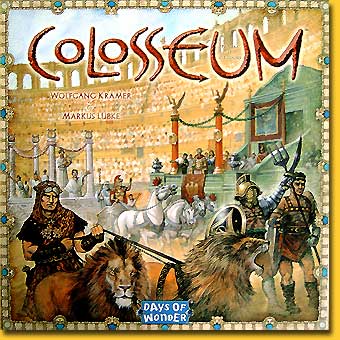 |
‘Bring in the gladiators!’ With a flourish of trumpets a new spectacle starts that does not have its equal in the city of Rome of our days. Except for the gladiators, comediants are also on the program. Sumptuous decorations add to the atmosphere to impress the spectators. Being the impressario of the festivities, offering to the gods is only the last and insignificant link in the chain; we have done everything in advance to exclude coincidences and to outwit the local competitors. What? Lions? They have lions! We have to have lions too, or better, horses, but then plenty of them! For the spectators have a choice of which spectacle to attend, and as they are only capable being present at one location at a time, they go to the one with the largest impact.
|
| x |
|
|
|
|
|
|
|
|
|
|
|
|
|
|
|
|
|
|
|
|
|
|
|
|
|
|
|
|
|
|
|
|
|
|
|
|
|
|
|
|
|
|
|
|
|
| But to earn our investment back, we need them for our income. The gladiators - well: those who survived - must be paid, and the same goes for the comediants and the priests; and what would a Roman citizen think a bouquet costs nowadays, let alone a whole arena full of them? No, money almost runs away quicker from our business hands as it was sluggishly earned. The spectators are bored quite easily, so they want to see more, and larger events. Apart from this we have to keep ahead of our competitors. Dealing with these problems that will give us many worries is the reality that announces itself in this game. |
| x |
|
|
|
|
|
|
|
|
|
|
|
|
|
|
|
|
|
|
|
|
|
|
|
|
|
|
|
|
|
|
|
|
|
|
|
|
|
|
|
|
|
|
|
|
|
|
|
|
The players have five rounds to decorate the own arena, expand it, contract artists, and to compose a program and execute it. Two little program have been handed out to the players at the start of the game, together with a bunch of random artists, animals and props. With this starting equipment and some money a player starts as an impressario. In this function he will not miss the local auction: it is here that new artists, animals and props can be acquired, but they come in sets of three, so among the Italian tenor with his impressive falset and Mr. Ed who chatters even away from his box, there is this vase of peonies that cannot be fitted in the actual program. Fortunately, each player has a trading opportunity after the auction: ‘Can I have your MagLite torch, then you can have my field preacher that you lack, and wait: I will add five money in the deal.’ |
| x |
|
|
|
|
|
|
|
|
|
|
|
|
|
|
|
|
|
|
|
|
|
|
|
|
|
|
|
|
|
|
|
|
|
|
|
|
|
|
|
|
|
|
|
|
|
After this each player holds his event, and everyone else their breath: will he manage to attract more spectators than I? On each program the amount of spectators is given when performing a ful show. Not every impressario is evenly lucky or capable in contracting or completing his program, so also on the program are the amounts of spectators when one or more of the artists are lacking. The arenas are connected with a circuit along which the nobles wander and possibly attend the arena of one of the players. Before executing his program, a player throws a die to move one of these six nobles; if it ends in his arena it will earn him additional spectators: a senator brings in 3, the consul 5, and the emperor himself even 7 spectators.
|
|
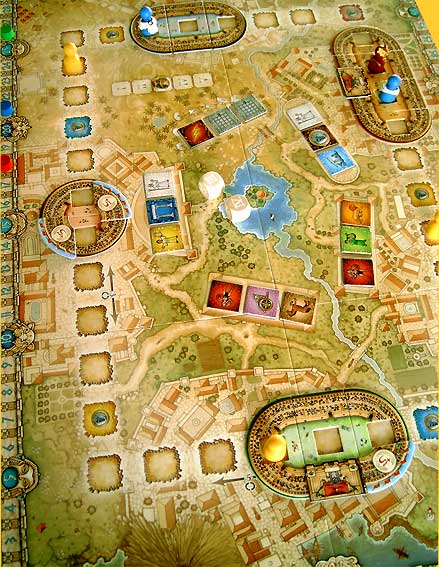 |
| x |
|
|
|
|
|
|
|
|
|
|
|
|
|
|
|
|
|
|
|
|
|
|
|
|
|
|
|
|
|
|
|
|
|
|
|
|
|
|
|
|
|
|
|
|
|
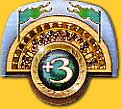 |
|
The thus acquired spectators are marked on the spectator track, and this score at the same time is the amount of money that gets paid out to that player. A player who managed to attract the most spectators, earns a podium, that will bring in an extra 3 spectators on any next held event. After this all players will have to dispose one of their participating artists, animals or props; it is a wear and tear wastage, it is! The player who currently is the lowest on the spectator track may take away one item from the player with the highest score - we are confronted with the Roman interpretation of the Early Christian ‘the Last will be with the First’! |
| x |
|
|
|
|
|
|
|
|
|
|
|
|
|
|
|
|
|
|
|
|
|
|
|
|
|
|
|
|
|
|
|
|
|
|
|
|
|
|
|
|
|
|
|
|
|
| A new round starts with the purchase of items such as a new, prefarably larger program that with the input of more artists attracts more spectators. The larger and more impressive programs need more space, so the arena has to extended, which can also be done in this phase. Unfortunately only one item may be bought at a time, so this acquirement will have to wait until a further round, as will the season ticket that brings in five extra spectators, or the emperor loge, with which a player may throw with two dice for the nobles, thereby increasing his chances of a noble attending his arena. |
|
 |
| x |
|
|
|
|
|
|
|
|
|
|
|
|
|
|
|
|
|
|
|
|
|
|
|
|
|
|
|
|
|
|
|
|
|
|
|
|
|
|
|
|
|
|
|
|
|
 |
|
A player may earn an emperor medal; this occasionally shows up at the auction but usually it will be collected on the circuit where the nobles move. At regular intervals on this track are coloured spaces; when a noble ends his movement there, the active player gets a medal. Well, nice, a medal, but what to do with it?
|
| x |
|
|
|
|
|
|
|
|
|
|
|
|
|
|
|
|
|
|
|
|
|
|
|
|
|
|
|
|
|
|
|
|
|
|
|
|
|
|
|
|
|
|
|
|
|
Turning in two of them allows a player to buy two items instead of one, and this is very convenient because now it is possible to buy a larger program ànd buy the necessary extension for the arena. Further, one medal can be used to pump up the volume of the spectators for an event by three, to trade it in for six money, or move one noble an additional three spaces, thereby bringing it just in time for the spectacle inside the walls of your arena.
At the end of the fifth round, the player who held the event that attracted the most spectators has won the game.
The score for the spectators is not cumulative: each event is checked how many spectators were attracted by the show; when it is more than the current score, the marker is adjusted accordingly; when it is less, the marker remains unchanged but the money is paid out according the lesser amount of spectators.
|
x |
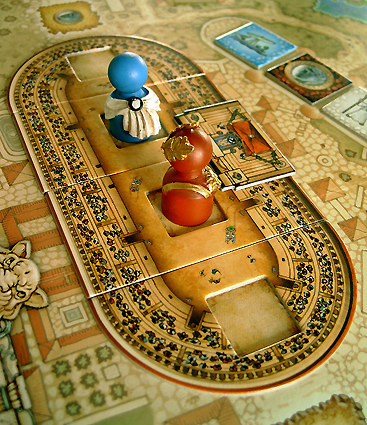 |
 |
|
|
|
|
|
|
|
|
|
|
|
|
|
|
|
|
|
|
|
|
|
|
|
|
|
|
|
|
|
|
|
|
|
|
|
|
|
|
|
|
|
|
The game has a low entry level, but it plays on a higher level. For instance, when buying a program, it is wise to already have a look at the following program in line that fits with the current stable of artists, because a player is not very flexible in changing his items, and he will surely not be able to change it completely. The starting stock of program items can benefit one player more than it does another, but it never is completely hopeless. Even a player who each round continues to perform his initial small program and for four turns is below the 20 spectators on the spectator track, is able to buy and perform a large program in his last round and win the game by making a final and large jump. It therefore is not about continuity, but about the one time high scoring quantity of a single spectacle. Each program is different of composition, in items as well in spectators, but of course the higher amounts of spectators are linked with the programs that require more items.
|
| x |
|
|
|
|
|
|
|
|
|
|
|
|
|
|
|
|
|
|
|
|
|
|
|
|
|
|
|
|
|
|
|
|
|
|
|
|
|
|
|
|
|
|
|
|
|
 |
xxx |
 |
|
| x |
|
|
|
|
|
|
|
|
|
|
|
|
|
|
|
|
|
|
|
|
|
|
|
|
|
|
|
|
|
|
|
|
|
|
|
|
|
|
|
|
|
|
|
|
|
| The auction is much more fun with the variant rules that can be downloaded; these will be incorporated in the rules in a next print run. |
| x |
|
|
|
|
|
|
|
|
|
|
|
|
|
|
|
|
|
|
|
|
|
|
|
|
|
|
|
|
|
|
|
|
|
|
|
|
|
|
|
|
|
|
|
|
|
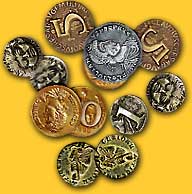 |
The game is beautifully executed, and this gives it right away a nice atmosphere, starting with laying out the large game board. This and all components are very stylishly illustrated by Julien Delval. The chits are very clear and have bright colours; the game money seems to have made use of old Roman coins for the background illustrations, adding again to the complete playing feeling. It is completely needless to name the programs, but it certainly adds to the atmosphere: ‘Anthem to Cupido’ has plentiful musicians in its program, and with ‘Galleys of Apollo’ one can surely imagine what the main part of the program is.
    
|
| x |
|
|
|
|
|
|
|
|
|
|
|
|
|
|
|
|
|
|
|
|
|
|
|
|
|
|
|
|
|
|
|
|
|
|
|
|
|
|
|
|
|
|
|
|
|
Each player has a large and clear game overview in colour, with the composition of all programs on its other side, so planning can be optimal. And did we mention the execution of the nobles already? These are beautiful large coloured tokens, with for the consuls a white robe, and the emperor crowned with golden laurels!
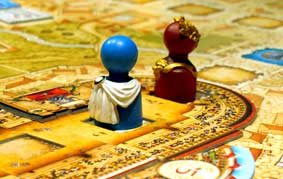 |
|
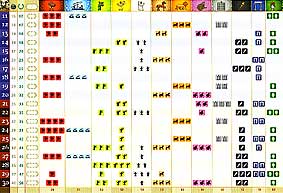
x x x x x |
| x |
|
|
|
|
|
|
|
|
|
|
|
|
|
|
|
|
|
|
|
|
|
|
|
|
|
|
|
|
|
|
|
|
|
|
|
|
|
|
|
|
|
|
|
|
|
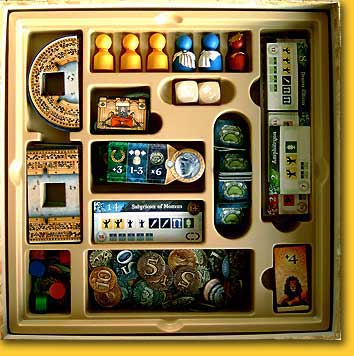 |
x |
Furthermore it is a joy to see how everything fits and has its own place in the box; there even is a separate sheet that depicts how the various components should be stored. A small deficiency however is the lacking of the manual 'Golden Tip of How to Win the Game' - nah, just kidding!
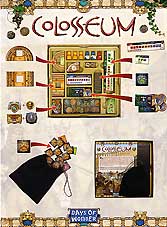 |
| x |
|
|
|
|
|
|
|
|
|
|
|
|
|
|
|
|
|
|
|
|
|
|
|
|
|
|
|
|
|
|
|
|
|
|
|
|
|
|
|
|
|
|
|
|
|
Days of Wonder has done more than release a good and playable game with a low entry level; it has once again made a statement: that it understands that there is a market for a game with wealthy execution and abundant components.
© 2007 Richard van Vugt
Colosseum, Wolfgang Kramer & Markus Lübke, Days of Wonder, 2007 - 3 to 5 players, 10 years and up, 60 to 90 minutes
|
  |
|
|
|
|
|
|
|
|
|
|
|
|
|
|
|
|
|
|
|
|
|
|
|
|
|
|
|
|
|
|
|
|
|
|
|
|
|
|
|
|
|
  |
|
|
|
|
|
|
|
|
|
|
|
|
|
|
|
|
|
|
|
|
|
|
|
|
|
|
|
|
|
|
|
|
|
|
|
|
|
|
|
|
|
  |
|
|
|
|
|
|
|
|
|
|
|
|
|
|
|
|
|
|
|
|
|
|
|
|
|
|
|
|
|
|
|
|
|
|
|
|
|
|
|
|
|
  |
|
|
|
|
|
|
|
|
|
|
|
|
|
|
|
|
|
|
|
|
|
|
|
|
|
|
|
|
|
|
|
|
|
|
|
|
|
|
|
|
|
  |
|
|
|
|
|
|
|
|
|
|
|
|
|
|
|
|
|
|
|
|
|
|
|
|
|
|
|
|
|
|
|
|
|
|
|
|
|
|
|
|
|
  |
|
|
|
|
|
|
|
|
|
|
|
|
|
|
|
|
|
|
|
|
|
|
|
|
|
|
|
|
|
|
|
|
|
|
|
|
|
|
|
|
|
  |
|
|
|
|
|
|
|
|
|
|
|
|
|
|
|
|
|
|
|
|
|
|
|
|
|
|
|
|
|
|
|
|
|
|
|
|
|
|
|
|
|
  |
|
|
|
|
|
|
|
|
|
|
|
|
|
|
|
|
|
|
|
|
|
|
|
|
|
|
|
|
|
|
|
|
|
|
|
|
|
|
|
|
|
| x |
|
|
|
|
|
|
|
|
|
|
|
|
|
|
|
|
|
|
|
|
|
|
|
|
|
|
|
|
|
|
|
|
|
|
|
|
|
|
|
|
|
|
|
|
|
| x |
|
|
|
|
|
|
|
|
|
|
|
|
|
|
|
|
|
|
|
|
|
|
|
|
|
|
|
|
|
|
|
|
|
|
|
|
|
|
|
|
|
|
|
|
|
 |
|
|
|
|
|
|
|
|
|
|
|
|
|
|
|
|
|
|
|
|
|
|
|
|
|
|
|
|
|
|
|
|
|
|
|
|
|
|
|
|
|
 |
|
|
|
|
|
|
|
|
|
|
|
|
|
|
|
|
|
|
|
|
|
|
|
|
|
|
|
|
|
|
|
|
|
|
|
|
|
|
|
|
|
| x |
|
|
|
|
|
|
|
|
|
|
|
|
|
|
|
|
|
|
|
|
|
|
|
|
|
|
|
|
|
|
|
|
|
|
|
|
|
|
|
|
|
|
|
|
|
 |
|
|
|
|
|
|
|
|
|
|
|
|
|
|
|
|
|
|
|
|
|
|
|
|
|
|
|
|
|
|
|
|
|
 |
|
|
|
|
|
|
|
|
|
|
|
|
|
|
|
|
|
|
|
|
|
|
|
|
|
|
|
|
|
|
|
|
|
|
|